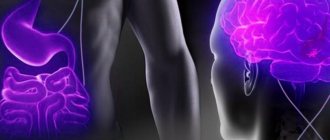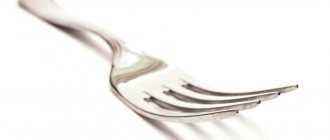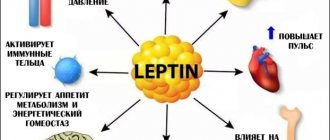Eat more protein or fat
Not all foods satisfy hunger equally. Eating protein and fatty foods can reduce hunger. Research shows that protein and fat are essential to satisfy hunger and help you feel full longer.
Recommended protein-rich foods
- lean meat;
- eggs;
- beans and peas;
- nuts;
- soy products;
- yogurt.
Foods that are sources of fat:
- nuts;
- seeds;
- avocado;
- olive oil;
- cheese;
- coconut;
- eggs.
TASTE HUNGER
It corresponds to the desire to feel a specific texture on the tongue (mousse, jelly, etc.). What feels good and what doesn't is determined by genetics, family, and culture. Our taste buds force us to eat more than we need, just for the pleasure of it. To calm them down, it’s correct:
- Try the same product in different consistencies, as is customary in Japanese cuisine. For example, alternate raw fish with boiled, grilled or battered fish.
- Eat a varied diet. It’s not for nothing that the chefs of the most famous restaurants bend over backwards to invent something unusual.
Choose foods high in fiber
Fiber is not broken down like other foods, so it stays in the body longer. This slows down digestion and the person feels full for a long time. Research shows that fiber may be effective in suppressing appetite. High-fiber diets are also associated with lower rates of obesity.
High fiber foods:
- whole grain;
- beans;
- fruits: apples and avocados;
- almond;
- Chia seeds;
- vegetables.
VISUAL HUNGER
An eclair in a pastry shop literally screams: “Eat me!” Looking at a cookbook makes you salivate. This is eye hunger. “The sight of food triggers the release of hormones and insulin,” comments psychotherapist and nutritionist Gerard Apfeldorfer. “They sharpen the appetite.” How to control your appetite:
- Try to switch your attention and “eat” something else with your eyes, for example, a magnificent landscape or a good photograph. Perhaps this will be enough and hunger will disappear.
- Set the table and arrange food beautifully on plates, even if you are having lunch or dinner alone.
- Before you start eating, carefully examine the contents of your plate, not your iPad or iPhone.
Stress Reduction
Researchers have linked stress to increased appetite and the desire to drink alcohol. Regular sleep, social contact and relaxation will help manage stress.
Foods that minimize appetite:
- Switching from sugar to honey may reduce your appetite;
- Foods rich in protein and healthy fats are best for reducing appetite. These include lean meats, avocados, beans, nuts and cheese;
- High fiber foods help a person feel full. Good examples are whole grains, beans, fruits and vegetables;
- Dark chocolate is a better appetite suppressant than milk chocolate;
- Eggs promote a feeling of fullness and reduce hunger;
- Ginger reduces appetite, possibly due to its stimulating effect on the digestive system;
- Pepper may reduce appetite in people who are not accustomed to spicy foods;
- Tea can reduce appetite and improve mood when combined with intense exercise.
Limiting your food intake can lead to overeating. Instead, eating healthy foods can reduce your appetite. A person can suppress their appetite by including more protein, fat, and fiber in their diet. To combat unwanted food cravings, various spices such as ginger, cayenne pepper and tea can also help.
OLfactory HUNGER
A person can distinguish ten thousand smells and often enjoys the aroma of food no less than its taste. Brioche, roast or steak... One fragrance can whet your appetite. To satisfy such hunger, you need:
- Inhale the aromas of the foods on the plate, just as we do with a glass of wine.
- While eating, concentrate on the smells - inhale, inhale, inhale.
- Regularly arrange an aromatherapy session with your favorite notes - vanilla, almond, cocoa - and observe what emotions they give rise to.
Literature
- Alkhatib A., Atcheson R. Yerba Mate (Ilex paraguariensis) metabolic, satiety, and mood state effects at rest and during prolonged exercise //Nutrients. – 2021. – T. 9. – No. 8. – P. 882.
- Chambers L., McCrickerd K., Yeomans MR Optimizing foods for satiety //Trends in food science & Technology. – 2015. – T. 41. – No. 2. – pp. 149-160.
- Clark MJ, Slavin JL The effect of fiber on satiety and food intake: a systematic review //Journal of the American College of Nutrition. – 2013. – T. 32. – No. 3. – pp. 200-211.
- Clark S., Duncan AM The role of pulses in satiety, food intake and body weight management // Journal of Functional Foods. – 2017.
- Corney RA, Sunderland C., James LJ Immediate pre-meal water ingestion decreases voluntary food intake in lean young males //European journal of nutrition. – 2021. – T. 55. – No. 2. – pp. 815-819.
- Dahl WJ, Stewart ML Position of the academy of nutrition and dietetics: Health implications of dietary fiber //Journal of the Academy of Nutrition and Dietetics. – 2015. – T. 115. – No. 11. – S. 1861-1870.
- Flood JE, Rolls BJ Soup preloads in a variety of forms reduce meal energy intake //Appetite. – 2007. – T. 49. – No. 3. – pp. 626-634.
- Waldman HS et al. A shift toward a high-fat diet in the current metabolic paradigm: A new perspective //Nutrition. – 2021. – T. 46. – P. 33-35.
- Vij VAK, Joshi AS Effect of excessive water intake on body weight, body mass index, body fat, and appetite of overweight female participants // Journal of natural science, biology, and medicine. – 2014. – T. 5. – No. 2. – P. 340.
- Vander Wal JS et al. Short-term effect of eggs on satiety in overweight and obese subjects //Journal of the American College of Nutrition. – 2005. – T. 24. – No. 6. – pp. 510-515.
CELL HUNGER
Do you want honey when you have a cold? Chicken noodles after the flu? Chips in a summer park? These desires can either express the body’s needs for certain nutrients and microelements, or simply be a whim. To learn to feel whether these are the true aspirations of our body, it is useful to practice a little:
- When looking at a bag of chips, ask yourself: “Am I sure this will make me happier?” And until you get an answer, don’t clog your stomach.
- Always drink a glass of water before meals: thirst can easily be confused with hunger.
When eating, focus on food.
As children, we were all told not to talk with our mouths full while eating. Partly because he's just rude. But at the same time, talking is distracting. And distraction while eating very quickly leads to overeating. Why?
Because the brain must constantly process signals entering the body during food intake in order to determine the level of satiety. However, when our brain is busy watching TV, scrolling through our phone, or talking to the person sitting next to us at the table, the assessment of fullness remains in the background, and we begin to eat much more food without being completely full.
So while eating, focus on the food. Enjoy it. Don't get caught up in the TV or phone. And if you are eating with another person, swallow before you start talking to him, leave the dishes on the table and return to food after you talk.
Consequences
Over time, binge eating leads to numerous problems physiologically, psychologically and emotionally. Common side effects include depression, suicidal tendencies, and persistent anxiety. But the most common result is the appearance of excess weight, which leads to the following complications:
- insomnia;
- hypertension;
- apnea;
- gastrointestinal diseases;
- urolithiasis disease;
- diabetes;
- heart failure;
- hormonal disorders.
What is compulsive overeating?
Binge eating disorder is a form of eating disorder characterized by excessive consumption of food in a relatively short period of time without feeling hungry. The term “compulsion” means a syndrome of obsessiveness that arises from a periodic and irresistible desire. As a result, the urge to eat is psychological discomfort, and not a real feeling of hunger.
Most often it affects teenagers and young adults who are prone to depression and low self-esteem. Moreover, this is not necessarily a problem for an obese person; often the patient has fat mass within normal limits. It is important to know that compulsive overeating is not just an addiction, it is a real mental illness. Its main difference from bulimia is that the patient does not induce vomiting after a bout of gluttony and does not try in any way to get rid of the overwhelming amount of calories consumed.
While an obese person can pull himself together and get his figure in order, a person with compulsive overeating cannot control his attacks. That is why it is extremely important to understand at an early stage that there are problems of a psychological nature and to overcome them.
EMOTIONAL HUNGER
This is the story about him about the Madeleine cake, told by Marcel Proust. We associate childhood memories with specific foods or dishes. We eat them not for the taste, but to feel comfort, love and warmth again. Emotions are transferred to food, and this has nothing to do with hunger. The same thing happens when, with the help of treats, we try to cheer ourselves up, disperse boredom, brighten up loneliness, drown out anxiety, etc. How to deal with this?
- If you want to restore mental comfort, console yourself with a small portion, enjoying every crumb.
- Before eating, call a loved one, listen to your favorite music, take a fragrant bath. Perhaps the hunger will subside.
PHOTO: Getty Images
Remember why you are doing this
For example, if you are on a diet, remind yourself why you are doing it. If you're doing this to improve your health, read some articles about people with heart disease. Re-read these articles several times a day. This should curb the temptation to quit your diet.
The cardiovascular system is primarily affected by obesity. Every obese person is a potential patient for a cardiologist. Obesity, in fact, is the cause of increased mortality in such people. The heart of obese people has a “transverse position”, since the diaphragm is located higher than normal, and in general the size of the heart is larger than normal. In addition, fat is deposited between the layers of the pericardium, becoming like a case, and the fat formed between the muscle fibers of the heart causes their degeneration. All this interferes with the normal functioning of the heart. Death from cardiovascular diseases with obesity is twice as common as with normal and low nutrition.
You may find that visualizing the long-term consequences will strengthen your resistance. For example, if you are tempted to eat something sweet, imagine a patient with obesity and the resulting concomitant diseases - diabetes, hypertension, atherosclerosis, etc. Imagine how terrible you will feel, how much money you will have to spend on treatment and what trials your family will face.
Main symptoms
In order to suspect that you have this disease, it is enough to identify the following signs:
- lack of satiety, despite a considerable amount of food eaten;
- eating alone, without others;
- a large amount of food consumed in a short period of time;
- seeking pleasure exclusively in gastronomic terms;
- in most cases, episodes of overeating occur under the influence of negative thoughts or feelings - frustration, guilt, resentment, etc.;
- inability to resist the urge to overeat;
- after an attack there is discomfort in the stomach, a feeling of distension;
- feeling of guilt, disgust and dissatisfaction with oneself after a meal. All this causes severe depression, leading to catastrophic consequences.











